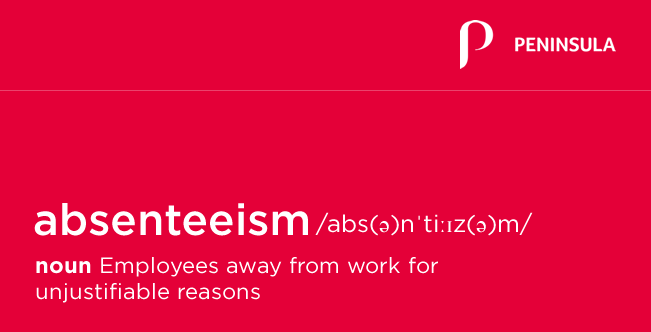It's not uncommon for employees to be absent from work due to ill health or injury. However, when they're away from work for unjustifiable reasons, this is called absenteeism.
Read our guest blog post by Alan Price (Chief Operations Officer) from the Peninsula Group Limited.

It’s not uncommon for employees to be absent from work due to ill health or injury. However, when they’re away from work for unjustifiable reasons, this is called absenteeism.
Absenteeism is a pattern of unauthorised absence from work without a good reason.
While many factors determine an employee’s productivity and attendance at work, one major element is the culture of your company.
In this piece, we’ll explore how your company culture can affect the attendance of your workforce. We’ll also highlight some tips for improving your company culture.
The importance of company culture
The importance of positive company culture cannot be overstated. Apart from an increase in engagement, companies that invest in promoting a positive company culture also reported an increase in job satisfaction and retention for their employees and overall growth for their organisation.
Elements affected by company culture include:
- Improved reputation.
- Improved employee health.
- Business growth and longevity.
- Reduced presenteeism and absenteeism.
Your company (or organisational) culture refers to the social order within the organisation. It sets the guidelines for expected behaviour and practices and has the power to make or break a business. To summarise, it’s everything an organisation does to cultivate growth by engaging and valuing every employee while offering them a voice.
Good company culture is based on honesty and productive conversation that helps the company identify issues with itself, as well as resolutions to these issues. Bad company culture on the other hand, is one with low retention rates and toxic relationships. A toxic work environment is the last thing you want as it can put additional strain on your workforce and put your business at risk.
Signs of a damaged company culture include:
- Office gossip.
- Lack of respect.
- Lack of empathy.
- Hypercompetition.
- Little to no flexibility.
- Unmotivated employees.
- Lack of processes and leadership.
- Lack of or poor internal communication.
Tips on improving your company culture
While there’s no quick fix for sorting out your company culture, there are some things you can do to improve your employee’s experience at work.
Define your goals and values – This is a crucial part of any business. When you have people working together, they need to be working towards the same goal. By establishing these goals ahead of time, you’re ensuring that everyone is on the same page from the get-go.
Engage: The best way to cater to the needs of your employees is by listening to what they have to say. They’re in the best position to tell you what’s working and what’s not. So, you can do this by creating an environment to let their opinion be heard.
Feedback: According to research from Clutch, 66% of employees who receive accurate and consistent feedback feel more fulfilled in their jobs. By providing regular feedback to your workforce, you’re confirming that their performance aligns with your values, which goes on to motivate them further.
Rewards: Similar to feedback, by rewarding your employees you’re confirming behaviour and practices that align with the goals and values of your organisation. As well as improving the culture of an organisation, rewarding employees also plays a role in increasing retention rates.
Communication: This is important when a group of different people work together to achieve a single goal. By effectively communicating your goals, objectives and values as well as the reasons for them, employees feel less like a cog in the machine and more like a key member of a team.
Collaboration: Encouraging collaboration between teams helps to develop interdepartmental relationships across the business. Consider introducing technology that fosters collaboration, such as Slack, Google’s Hangouts or Facebook’s Workplace.
Flexibility: The way we do business is changing and so are the types of employees we hire. Offering options for flexible working opens your company up to a new calibre of workers. Consider introducing flexible working options to give employees more independence.
Final thoughts
The company culture you have determines how your employees and customers communicate with you.
While this isn’t an extensive list, it will get you on your way to improving your organisational culture. Remember to embrace transparency, as trust is said to be the foundation of great company culture.
About the author
This blog was was written and supplied by Alan Price, Chief Operations Officer at the Peninsula Group Limited

Similar articles
27.FEB.2026
Sick leave is one of the biggest hidden costs in any organisation — but only if you’re tracking it the hard way.
Modern teams are moving away from spreadsheets and email chains and adopting structured tools that make absence management clearer, fairer, and far more efficient. WhosOff is leading that shift, with features built specifically for accurate, compliant sick leave tracking.
04.DEC.2025
It’s the season of giving, and we’ve got some gifts for you — fresh updates to WhosOff that make managing leave faster, smarter, and easier than ever.
From brand-new security options to a complete re-write of the WhosOff calendar (yes, it’s lightning fast!), these changes are designed to save you time and keep your team running smoothly.
02.DEC.2025
Preparing holiday allowances now sets your business up for a smoother, more productive 2026. Tools like the WhosOff Holiday Calculator make it easy to get the numbers right — and ensure your team feels valued and supported.
11.NOV.2025
Thinking of your Christmas list? How about what you really need to help run your business? WhosOff will be sitting at the top of business lists for Christmas, here's why
